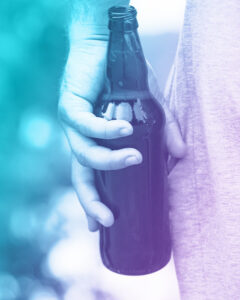Alcohol Shakes
It’s an all too familiar feeling: the puking, shaking, heart pounding, and head racing. Most people would probably be concerned that something was wrong with their body, but not you. It is a rare morning when you don’t wake up anxious, your body craving any form of alcohol it can find. This morning is no different as you roll over and reach your shaky hand to check the time on your phone.

Thankfully, it’s after 9 am, and the liquor store down the street is open for business. It gets difficult trying to dress yourself with a pounding headache, but you manage and head on your way. The clerk sees you and already sets a bottle on the counter. With shaking hands, you manage to get the money from your pocket and hand it over. You take your bottle home and pour a hefty glass, spilling a little from the trembling. After that first swig, you instantly feel better. Your body and mind calm with each sip. You know this is not healthy, but the shaking and anxiety are too much. Alcohol has become a necessity, but you wonder if there will be a time when you can break free.
In 2019, 19.7% of adults in Manatee County engaged in binge or heavy drinking. Clean Recovery Centers has been helping hundreds in our Suncoast communities begin their recovery journey. The body can become dependent on alcohol before the person even realizes it. Our program addresses all aspects of addiction through our unique, three-phase approach. With housing options at all of our locations, you will never have to worry about where you will be staying. So, what causes alcohol shakes and how long do they last?
What Are Alcohol Shakes?
Alcohol shakes refers to the trembling and shaking of the extremities between drinking sessions. They are a common sign of dependence as they are a symptom of withdrawal. Alcohol shakes can begin in as little as 6 hours after the last drink in someone who is managing an alcohol use disorder. They can also be a sign of organ damage in the brain or liver.
Causes Of Alcohol Shakes
Alcohol shakes are often associated with withdrawal, however, there are other more serious circumstances where they are caused by different conditions. Alcohol is known to affect the liver and the brain – among other organs. These two specifically can have side effects such as shakiness when they are damaged from alcohol.
Shaking From Alcohol-Related Brain Damage
Shaking and tremors in the brain can be caused by various conditions and scenarios, and alcohol can be a factor. Alcohol increases the risk of having a stroke, which can cause lasting and permanent brain damage. When the area of the brain that controls motor function becomes impaired, uncontrollable muscle movements such as shaking can occur. In some cases, the brain can heal from the damage but there is no guarantee the shaking will stop.
Cerebellar tremors are caused by chronic alcohol use disorder. These tremors typically occur after a purposeful movement. This means they can occur after clicking a pen or opening a book. Cerebellar tremors occur in the hands, arms, legs, and feet. They are caused by damage to the cerebellum that disrupts the pathways to other areas of the brain.
Tremors Caused By Liver Disease
Studies have shown that liver disease (both alcohol-related and not) can cause similar trauma to the cerebellum. This is known as hepto-cerebral degeneration. Other areas of the brain that are affected include the cortex and brainstem. All of these areas can cause tremors and shakiness when damaged. Alcohol causes the liver to stop functioning properly, leading to scarring that leaves the liver unable to process toxins. Hepto-cerebral degeneration is not well understood, and the leading cause is figured to be the build-up of toxins within the brain. Those with an alcohol use disorder are more likely to experience liver complications, leading to impaired brain function that can cause tremors.
Shakes From Alcohol Withdrawal
Alcohol withdrawal is known to cause shakes and tremors. The body views alcohol as a toxin and takes measures to try to remove it from the body. When drinking in excess, the body has no choice but to store alcohol in other areas, such as muscle. As alcohol consumption is stopped, the body is still processing the stored alcohol. After the stored alcohol is gone, the muscles can begin shaking from dehydration. This is where tremors come from.
With alcohol withdrawal, shakes can also be caused by enhanced physiologic tremors. These movements are typically in the hands and fingers and are small in action. They are not a neurological condition and are the body’s response to experiencing alcohol withdrawal. Enhanced physiologic tremors are not always permanent, and removing the cause typically makes them subside.
Why Do Alcohol Withdrawal Symptoms Occur?
While we mentioned how the body reacts to shaking and alcohol withdrawal, the main cause of symptoms comes from the brain. When the brain becomes used to having alcohol in the system, it adjusts its chemical balance to account for it. Taking alcohol away abruptly causes the brain to work in overdrive, adjusting and often overcompensating to balance chemicals. This can result in surges in some areas and decreases in others. Shaking, sweating, anxiety, and insomnia are common during withdrawal as a result of the brain trying to regulate the system.
Trying To Get Rid Of Alcohol Shakes Yourself
 It is not recommended to try to stop alcohol shakes on your own. However, if you are unable to get professional help, you can taper off alcohol at home. This would mean drinking less and less over time until drinking has stopped completely. Say you drink a fifth every day. To begin tapering, cut the fifth to around half per day for a week or two. The process would continue over several weeks or months until you were able to go without drinking completely.
It is not recommended to try to stop alcohol shakes on your own. However, if you are unable to get professional help, you can taper off alcohol at home. This would mean drinking less and less over time until drinking has stopped completely. Say you drink a fifth every day. To begin tapering, cut the fifth to around half per day for a week or two. The process would continue over several weeks or months until you were able to go without drinking completely.
The concern with at-home tapering is that the person may not adhere to a strict taper program. Drinking more than the taper level can affect withdrawal symptoms and how effectively the body is detoxifying. This is why it is recommended to treat alcohol shakes in a medical setting.
How To Stop Alcohol Shakes Safely
The safest way to stop alcohol shakes is to attend a medical detox facility. Both medical and mental health specialists will help you transition safely from heavy alcohol use to not drinking at all. They will monitor your vitals and overall health while beginning therapy for healing. The importance of medical staff is they can also address if the shaking is from a different condition. If they have concerns about your shakes, they can recommend the next steps and suggest testing to see if there is another cause within the body.
Medical Treatment For Alcohol Shakes
Many detox facilities utilize medications to treat withdrawal symptoms and alcohol shakes. Anti-seizure medications and naltrexone are common in treating withdrawal and helping ease the process of detoxification. If an underlying condition exists and is causing tremors, beta-blockers and anticholinergic medications may be needed to help stabilize the shakiness.
Finding Alcoholism Treatment In Manatee County, FL
Getting caught in the cycle of needing to drink to avoid withdrawal takes a toll on mental and physical health. The bright spot in the cycle is finding your breaking point and choosing alcohol use disorder treatment. Alcohol detox can be uncomfortable, but a facility with a dedicated and caring staff can make all the difference. It can seem daunting, picturing your life without drinking, but take a step back and think about what life was like before. Rediscovering yourself and your dreams will be the greatest achievement and open the doors to new beginnings.
If you or someone you love is experiencing alcohol shakes, look no further. Clean Recovery Centers has helped hundreds get clean, live clean, and stay clean. Our program focuses on therapy, skill-building, and wellness techniques that are unique and personalized. Besides nutrition counseling, we provide brain mapping, neuro/biofeedback, and acupuncture therapy. With our compassionate team, you will find what works for you and build a strong foundation for your recovery. Call us today at (888) 330-2532 to schedule an appointment.


